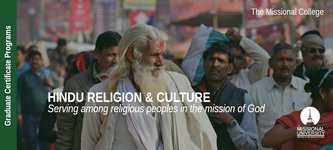
The Graduate Certificate in Hindu Religion & Culture offers students an understanding of Hindu religion and culture as it is practiced in predominant Hindu societies as well as it's influence on western culture. The program challenges Christians to think theologically and missionally and learn practical ways to serve among Hindu people in their community, country, and across the globe. The certificate enables students to gain the following capabilities:
Hinduism is the world's third-largest religion. It is an Indian religion and dharma, or way of life, widely practiced in the Indian subcontinent and parts of Southeast Asia. Hinduism has been called the oldest religion in the world, and some practitioners and scholars refer to it as Sanātana Dharma, "the eternal tradition", or the "eternal way", beyond human history. Scholars regard Hinduism as a fusion or synthesis of various Indian cultures and traditions, with diverse roots and no founder. Its followers, known as Hindus, constitute about 1.15 billion, or 15–16% of the global population. Hinduism is the most widely professed faith in India, Nepal, and Mauritius. It is also the predominant religion in Bali, Indonesia. Significant numbers of Hindu communities are also found in the Caribbean, Southeast Asia, North America, Europe, Oceania, Africa, and other countries. The Graduate Certificate in Hindu Religion and Culture provides students with an opportunity to understand Hindu philosophy, ethics, rituals, cultural norms, and practices; and to develop hands-on tools for Christian engagement with Hindu adherents.